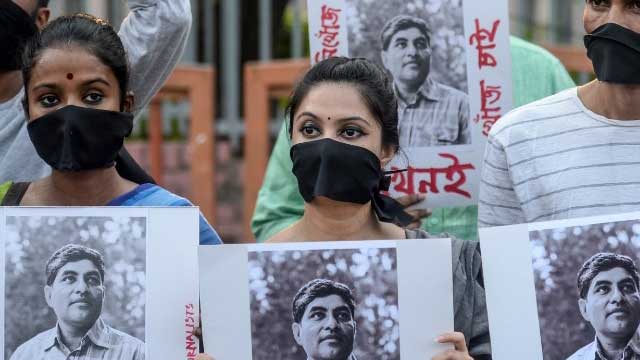ARTICLE 19, a United Kingdom based international human rights organization, has expressed its deep concerns over the arrests of students and university teachers for Facebook posts allegedly demeaning and humiliating late Awami League presidium member Mohammed Nasim.
It also expressed profound concerns over summoning of at least 10 journalists by the police authority after the publication of a report on the illegal activity of a senior cop, said a statement issued by the organization.
ARTICLE 19 observed that there have been persistent attacks, threats and intimidation and lawsuits against various classes and professions across the country, especially writers and journalists, over reports of corruption, irregularities and simply expression through news, cartoons, photographs and social media amid the Covid-19 pandemic.
In the statement, Mr Faruq Faisel, regional director for Bangladesh and South Asia of ARTICLE 19 said: “Responses to the Covid-19 outbreak should reflect international human rights guarantees, including those relating to the right to freedom of expression and information.”
"It is observed that instead of protecting journalists, whistle-blowers and human rights defenders, the Bangladesh government continually harasses and prosecutes them."
The government has taken advantage of the Covid-19 pandemic to ramp up its attack on civic freedoms, reads the press release.
Using the notorious Digital Security Act, 2018 to suppress reporting or public discourse not only infringes human rights but also impedes Bangladesh’s endeavour to combat the crisis.
Transparency and accountability of the actions, free flow of information, citizen’s engagement and commitment to upholding human rights are the key to successfully tackle this pandemic, Faisel said.
According to media reports, Sirajam Munira, a lecturer at the Department of Bangla of Begum Rokeya University, was arrested on June 14 for a case filed against her under the Digital Security Act.
Munira reportedly posted a status on her profile on Facebook allegedly demeaning and humiliating late Awami League presidium member and former health minister Mohammed Nasim, a lawmaker from Sirajganj 1 constituency who died recently from coronavirus infection.
Kazi Jahidur Rahman, a lecturer at the Department of Computer Science and Engineering of Rajshahi University was also arrested on June 18 under the same act, over a social media post allegedly criticizing Mohammed Nasim.
Authorities of Shahjalal University of Science and Technology have sued a student of the university under the Digital Security Act for an alleged derogatory post on Facebook about Nasim, as well.
Nine cases have been filed in total under the act following the death of the former health minister.
Recently, various newspapers and television channels covered a report about a letter the Dhaka Metropolitan Police (DMP) Commissioner Mohammad Shafiqul Islam sent to the Inspector General of Police (IGP) saying that DMP’s erstwhile joint commissioner Imam Hossain gave him an unethical proposal for bribes. The report on the letter was published in the media on June 5.
Instead of investigating the bribe allegation, the police authority emphasized on finding out how journalists came to know about the matter, said ARTICLE 19.
They have been looking for the person who disclosed the information to journalists. A police investigation team has summoned the journalists who published the report.
Freedom of expression during the pandemic
According to the report of Prothom Alo on June 22, the information of the Department of Health has created confusion in the minds of the people.
Information related to the number of Covid-19 patients, diagnostic tests, hospital information is inaccurate and ambiguous. Covid-19 control initiatives are being delayed due to data constraints, said the same report.
Accurate information is needed for epidemic situation assessment, projection, policymaking, planning and implementation, however, accurate information is not available, it added.
ARTICLE 19 has been closely monitoring the situation in Bangladesh since the preparedness was on to deal with the coronavirus.
In response to the pandemic, opacity in the action plan, acute lack of coordination at the policy-making level and sheer absence of accountability are deepening the crisis in Bangladesh, said ARTICLE 19.
At the same time, the right to information and freedom of expression are experiencing unprecedented repression. It seems the Bangladesh government entrenches repressive measures and uses the country's much-criticised Digital Security Act to suppress dissent and critics of government initiatives in dealing with Covid-19.
Surveillance, restrictions on free expression and information, and limits on public participation are increased much more than normal time.
Journalists have also been subjected to beating and torture for reporting irregularities in distribution of humanitarian aid including embezzlement by members of local government and locally powerful individuals, mostly belonging to the ruling party.
Furthermore, other critics who have been targeted include students, opposition activists, academics, cartoonists and writers.
Due to the muzzling of the press by the authorities, social media has become the preferred platform for those critical of the regime, reads the press release.
In response, the police and the RAB have started picking up people for their Facebook posts.
Faisel said: “Media serves a vital function in times of public health emergencies by informing the public and monitoring government actions. It can also contribute to preventing disinformation, misinformation and fake news related to the Covid-19 crisis.”
“Independent journalism, citizen reporting, open public discourse and the free flow of information can hold the government responsible for negligence, mismanagement, irregularities, and corruption while dealing with Covid-19.”
ARTICLE 19 called for the release of all individuals including journalists arrested under the Digital Security Act for expression, and to end the harassment of those reporting on coronavirus.





